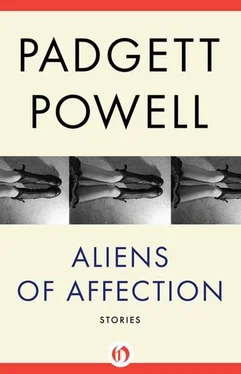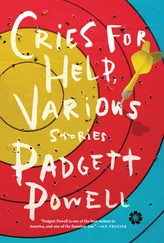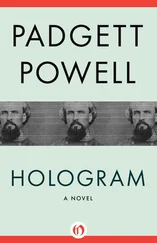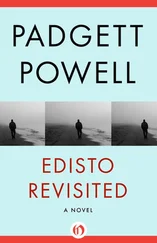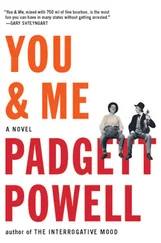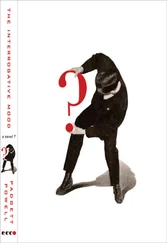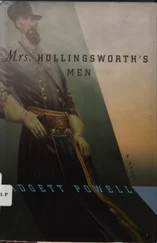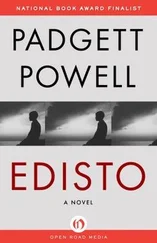Padgett Powell - Aliens of Affection - Stories
Здесь есть возможность читать онлайн «Padgett Powell - Aliens of Affection - Stories» весь текст электронной книги совершенно бесплатно (целиком полную версию без сокращений). В некоторых случаях можно слушать аудио, скачать через торрент в формате fb2 и присутствует краткое содержание. Год выпуска: 2013, Издательство: Open Road Media, Жанр: Современная проза, на английском языке. Описание произведения, (предисловие) а так же отзывы посетителей доступны на портале библиотеки ЛибКат.
- Название:Aliens of Affection: Stories
- Автор:
- Издательство:Open Road Media
- Жанр:
- Год:2013
- ISBN:нет данных
- Рейтинг книги:5 / 5. Голосов: 1
-
Избранное:Добавить в избранное
- Отзывы:
-
Ваша оценка:
- 100
- 1
- 2
- 3
- 4
- 5
Aliens of Affection: Stories: краткое содержание, описание и аннотация
Предлагаем к чтению аннотацию, описание, краткое содержание или предисловие (зависит от того, что написал сам автор книги «Aliens of Affection: Stories»). Если вы не нашли необходимую информацию о книге — напишите в комментариях, мы постараемся отыскать её.
Typical
Typical
Aliens of Affection: Stories — читать онлайн бесплатно полную книгу (весь текст) целиком
Ниже представлен текст книги, разбитый по страницам. Система сохранения места последней прочитанной страницы, позволяет с удобством читать онлайн бесплатно книгу «Aliens of Affection: Stories», без необходимости каждый раз заново искать на чём Вы остановились. Поставьте закладку, и сможете в любой момент перейти на страницу, на которой закончили чтение.
Интервал:
Закладка:
I suspect I am guilty. Of what is vague, so what I’d like to do is confess to everything, serve my time, and come out clean and debtless to Society. Just go in for about, oh, thirty years, read some books and be buggered, try to stay in shape, and come out clean-slated. Until, I suppose, you talked to someone, you would not be guilty of anything. You could be very careful about what you did, what you acquired, whom you promised what, and maybe you could remain innocent in a way you really had no chance to as a child, coming out of that prison. You would be in a position to tell the world where to get off the bus. I remember seeing Tom Snyder say to Charles Manson, “Charles, get off the space shuttle.” This was in response to Charles’s affecting to not know about the murders, which piqued Tom. Charles is in a position to say, Get off the space shuttle to the world. Next to Hitler he is the Hamburglar. But.
Life is dominoes and regret. That is the common view, except you are supposed to manage the regret to its extinction. Some buffalo near here were corraled for a brucellosis check and one of them was positive but half the herd died fighting in the corral. That is how you manage something to extinction. I’ve had trouble in my day with dominoes and regret — you can control more in life than you do in a board game or a card game, and whatever regret obtains isn’t going to conveniently kill itself off in your lifetime. Regret is as perdurable as tar.
My back is stiff. Is that true, not true, relevant, not, sufficient, in-, necessary, un-? Life is cartilaginous approximating and infrequent bone-hard acting. Colorful tops that spin, children should, plenty of, have. Life I am not up to. It gets me down, and you’d think that funny but it’s not, it’s true, germane or no. How can the only thing we’re here to do — whether you understand it or not — strike you as unappealing or difficult or as something you’d rather not do? In a firestorm of mystery and event, you sit fixed on the plain of combat, repeating, “I’d rather not.”
When I got back from Mexico, I did not know what century it was or what sex I was, but other than that was fine. I felt relaxed. Felt. The condition of feeling relaxed when you are not is coma, if the misapprehension is physical, and comatose or catatonic if the misapprehension is psychological.
I don’t hopalong Cassidy. There’s weather and there’s change, of clothes, seasons, silver. And of weather. The weather is partly moldy. Mocher, moody, mooch, moreso.
Aliens of Affection
ALL ALONG THE WATCHTOWER — which he had never been on before and now that he was on it could not imagine what it was, or what it looked like, or what he looked like on the watchtower, other than the way he usually looked — Mr. Albemarle patrolled. At each end of his walk, or watch, or beat — he had no idea what you called the path he trod until the fog suggested he turn back and tread until the fog at the other end suggested he turn back again — Mr. Albemarle crisply about-faced, having seen and heard nothing. He was on the top of a wall, as near as he could tell, which was one of several walls, as near as he could tell, constituting a garrison or fort or prison, or, as near as he could tell, someone’s corporate headquarters. Where or how the term “watchtower” had obtained and why, he did not know. He was not on a tower, and if he watched anything it was that he not step off the wall into the cool gauzy air and fall he had no idea how far down onto he had no idea what. If he was on a watchtower, he could only surmise there was a moat, ideally with something dangerous in it, below. But he had no actual vision of anything, and no idea why he was on the watchtower, or whatever it was, no idea why he was walking it and no idea what he was watching for. He had an idea only about why the phrase “all along the watchtower” kept playing in his head: he’d heard it on the radio.
What he seemed to be doing, more than watching or towering or guarding, was modeling. He kept seeing himself stroll and turn in the fog on the wall as if he were on a runway, and he had multiple-angled views of himself, as if he were turning around before a tripartite mirror in a clothing store. There he was: some kind of guard (for what?) showing, mostly to himself, some clothes that looked strange on him, or not, that he would buy, or not, and have put in a bag, or not; he might wear them out of the store with his old clothes in a bag. That moment had given him a good feeling as a young man — wearing, as it were, virgin clothes fresh from the rack to the street, his old sodden worn duds in a lowly sack at his side. There were no pleasures, large or small, in his life now. He had mismanaged his affections.
All along the watchtower, then, in the fog, he watched, he supposed, for affection. That was the enemy. It was in the belly of a beautiful gift, companionship, which gift was always good to receive until this monster of happiness began to pour out of it and run amok and make him so happy that he betrayed it. Nothing so sweet as true affection could be trusted. True affection is too good to be true. It contains, perforce, disaffection. He walked his wall, all along the watchtower. The fog was lustrous and rising and a comfort. Mr. Albemarle pronounced, orated really, as though he were Hamlet, or some other rarefied speaker, which he was not, the following speech into the fog, aware that loud disputations of this sort surely violated the prescribed duties, whatever they were, of those who perambulate the watchtower:
My specialty is the mismanagement of affections. A cowboy of the heart, I head ’em up and move ’em out: lowing, bellowing, grunting, snorting emotions of slow stupid tenderness driven in mad droves to their end. All you need for this, in the way of equipment, is a good strong horse between your legs. I am a cowboy, or, as they say in Sweden, a cawboy. Caw.
Some sodiers showed up. “Hey! Cawboy!” they said, or one of them said. It was a sudden foggy profusion of boots and nylon webbing and weapon noise, all halt-who-goes-there, etc. Mr. Albemarle defended himself against soldiers by calling them, in his mind, sodiers. He defended himself against not ever having been one and the possible indictment of manhood that might constitute, and he defended himself against their potential menace now — as they halted him when he should have been halting them by the terms of his not clearly understood position all along the watchtower — by calling them, in his mind, sodiers. The sodiers said, “Hey, cawboy, you got any cigarettes?”
Mr. Albemarle did and shared them all around, and they were immediate fast friends, he and the sodiers.
“You sodiers are okay fine,” he boldly said to them.
“We know it,” they said, lifting their heavy steel helmets to reveal beautiful multicolored denim welder’s caps on backwards on each of their heads. They all smiled, each revealing one missing central incisor, right or left. There were nine sodiers and Mr. Albemarle did not have time to get a count, how many right, how many left incisors missing. He had once considered dentistry as a sop to his mothers hopes for him. A dentist talked him out of it. “I clean black gunk out of peoples mouths all day, son.” That did it. The same dentist, it occurred to him now, had earlier talked him out of being a sodier. “All you do is say, You three guys, go behind that truck and shoot the enemy. What’s there to learn in that?”
This was a sufficiently strong argument, with the black gunk looming as well, to talk young Mr. Albemarle out of enlisting in ROTC and getting educational benefits to allow him to go to dental school. The final straw was the dentists asking him what he, the dentist, might do about his sagging breasts. His years slumped over patients, cleaning black gunk, on a short stool on wheels, had not maintained a firm tone in the dentist’s pectoral muscles, and they indeed drooped, reminiscent of a budding girl’s breasts. Mr. Albemarle, who was then eighteen and in fine shape himself and not called yet Mr. Albemarle, told the dentist to lift weights, but to his knowledge the dentist never took his advice.
Читать дальшеИнтервал:
Закладка:
Похожие книги на «Aliens of Affection: Stories»
Представляем Вашему вниманию похожие книги на «Aliens of Affection: Stories» списком для выбора. Мы отобрали схожую по названию и смыслу литературу в надежде предоставить читателям больше вариантов отыскать новые, интересные, ещё непрочитанные произведения.
Обсуждение, отзывы о книге «Aliens of Affection: Stories» и просто собственные мнения читателей. Оставьте ваши комментарии, напишите, что Вы думаете о произведении, его смысле или главных героях. Укажите что конкретно понравилось, а что нет, и почему Вы так считаете.
